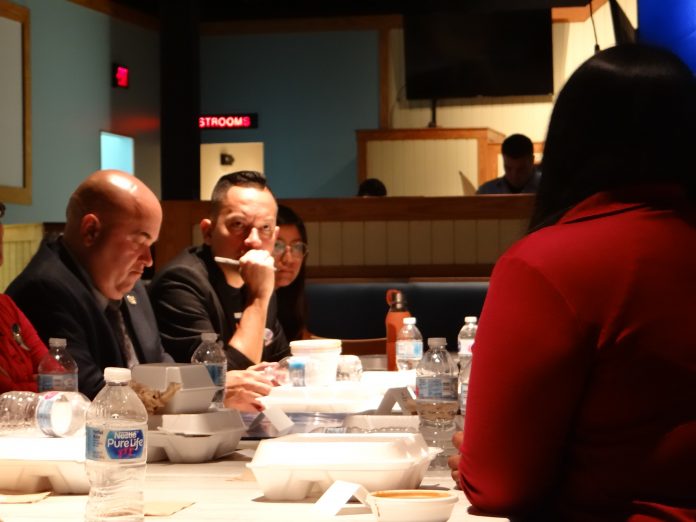
Castaways Sports Bar & Grill was empty, save a table set for 10 people. Karen Caudillo, who was one of those 10, sat on the far end of the table. She was the first to tell her story.
“I came to Mexico when I was four years old,” she said. “I don’t remember my homeland.”
Caudillo, a 21-year old business owner and political science student at UCF, had something in common with many of the people at the table. She is a DACA student, meaning that while she is protected from deportation under an Obama-era program while still being undocumented. She and the other DACA students sat alongside four Democratic members of the Florida legislature: Sen. Victor Torres (FL 15), Rep. Carlos Guillermo Smith (FL 49), Rep. Amy Mercado (FL 48) and Rep. John Cortes (FL 43).
The purpose of the dinner was to discuss the challenges facing undocumented students, including the over 100 DACA students who attend the University of Central Florida. While they are protected from deportation, the program is at risk of being axed by the Trump administration, which was reportedly working toward that aim as recently as last week.
“I have been suffering from anxiety and a lot of uncertainty,” Caudillo said. “I don’t know what my life is going to look like, I don’t know if I’ll be able to finish school.”
Caudillo, who lived in Naples before attending UCF, was a junior in high school when President Obama signed the executive order known as the Deferred Action for Childhood Arrivals, which gives undocumented people temporary protected status and a work permit if they entered the country before 2007 and before they turned 16.
- She said that she feels “privileged” for having received that protection, the product of years of advocacy from immigration actvists. Younger undocumented immigrants are known as DREAMers, in reference to a proposed law to provide protections and eventually a pathway to citizenship to those who arrived at the US as minors.
“President Obama may have signed DACA, but it was thanks to people who worked to get something done for DREAMers,” said Eli Garcia, an organizer for the Hope Community Center, which focuses in part on advocating on behalf of immigrant communities. She is also an undocumented student from Mexico.
Following DACA’s implementation, Garcia said, the HCC created legal clinics to help eligible people sign up for the program. Still, there is a lot more to be done.
“We’ve already helped something like 500 people, and we’re still working to help them as well as advocate for something more permanent,” she said.
And the congresspeople who attended the dinner share that fight. Smith, whose district covers UCF, is one of those leading the fight to protect undocumented students. While he was born in the US to a Peruvian father and a Canadian mother, he says he understands and sympathizes with undocumented people who “have to hide in the shadows.”
““The importance of this meeting is to first make sure that DREAMers know that they have people on their side who are willing to fight for them,” Smith said. “We want to send a message that in Donald Trump’s America, not everyone is against them. Second, hearing real-life stories keeps us grounded in the fight we are committed to.”
Last March, Smith sponsored a bill dubbed the Florida Trust Act, which would have, among other things, prohibited state and local governments from complying with federal immigration authorities without a court order. However, the bill did not even make it to committee, something which does not discourage Smith, who plans on continuing to file the bill for “as long as it takes.”
“It’s important to create that bond of trust between local law enforcement and local governments and immigrant communities, which has been shown to reduce crime,” he said.
But for students like Caudillo, it is an uphill battle. The Trump administration could end DACA in the coming weeks and both houses of the Florida legislature are controlled by Republicans.
“It’s our obligation to resist. We have to resist these unconstitutional, racist, and bigoted policies that are coming from the Trump administration because our communities depend on it,” Smith said.
Still, Sen. Torres said, immigrants have “economic power” in spite of not having political power. There are about 100,000 DACA recipients living in Florida, 8,000 of whom live in Orange County, according to the Migration Policy Institute. If all those people were to disappear, Torres said, the economy would suffer.
“When you touch the wallet of an American, they cry,” he said.
Garcia, the HCC organizer, said that what is important is for people to get involved and to contact their representatives to affect change. The dinner, she said, is one way of doing so.
“The people representing us who don’t know our stories or don’t sit down with us don’t know what we’re going through,” she said. “I believe it was important to see them.”
“We need to turn that fear into power.”
Cynthia Ramirez contributed to this report.



